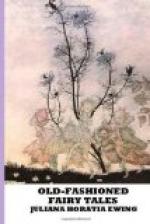Before long there was not a town dame or a fine country lady but must needs have a dress of the new stuff, and before the sixty-three hairs were used up, the fortunes of the weaver and his son were made.
About this time the miller’s memory became clearer, and he was often heard to speak of an old boy-and-girl love between his dear daughter and the wealthy manufacturer of the golden cloth. Within a year and a day Kind William married his sweetheart, and as money sticks to money, in the end he added the old miller’s riches to his own.
Moreover there is every reason to believe that he and his wife lived happily to the end of their days.
And what became of the water sprite?
That you must ask somebody else, for I do not know.
MURDOCH’S RATH[8].
[Footnote 8: Rath = a kind of moat-surrounded spot much favoured by Irish fairies. The ditch is generally overgrown with furze-bushes.]
There was not a nicer boy in all Ireland than Pat, and clever at his trade too, if only he’d had one.
But from his cradle he learned nothing (small blame to him with no one to teach him!), so when he came to years of discretion, he earned his living by running messages for his neighbours; and Pat could always be trusted to make the best of a bad bargain, and bring back all the change, for he was the soul of honesty and good-nature.
It’s no wonder then that he was beloved by every one, and got as much work as he could do, and if the pay had but fitted the work, he’d have been mighty comfortable; but as it was, what he got wouldn’t have kept him in shoe-leather, but for making both ends meet by wearing his shoes in his pocket, except when he was in the town, and obliged to look genteel for the credit of the place he came from.
Well, all was going on as peaceable as could be, till one market-day, when business (or it may have been pleasure) detained him till the heel of the evening, and by nightfall, when he began to make the road short in good earnest, he was so flustered, rehearsing his messages to make sure he’d forgotten nothing, that he never bethought him to leave off his brogues, but tramped on just as if shoe-leather were made to be knocked to bits on the king’s highway.
And this was what he was after saying:
“A dozen hanks of grey yarn for Mistress Murphy.”
“Three gross of bright buttons for the tailor.”
“Half an ounce of throat drops for Father Andrew, and an ounce of snuff for his housekeeper,” and so on.
For these were what he went to the town to fetch, and he was afraid lest one of the lot might have slipped his memory.
Now everybody knows there are two ways home from the town; and that’s not meaning the right way and the wrong way, which my grandmother (rest her soul!) said there was to every place but one that it’s not genteel to name. (There could only be a wrong way there, she said.) The two ways home from the town were the highway, and the way by Murdoch’s Rath.




